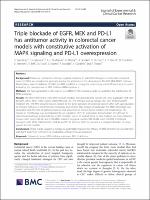| dc.contributor | Vall d'Hebron Barcelona Hospital Campus |
| dc.contributor.author | Napolitano, Stefania |
| dc.contributor.author | Matrone, Nunzia |
| dc.contributor.author | Muddassir, A. L. |
| dc.contributor.author | Martini, Giulia |
| dc.contributor.author | Sorokin, A. |
| dc.contributor.author | De Falco, Vincenzo |
| dc.date.accessioned | 2021-04-20T09:42:10Z |
| dc.date.available | 2021-04-20T09:42:10Z |
| dc.date.issued | 2019-12-16 |
| dc.identifier.citation | Napolitano S, Matrone N, Muddassir AL, Martini G, Sorokin A, De Falco V, et al. Triple blockade of EGFR, MEK and PD-L1 has antitumor activity in colorectal cancer models with constitutive activation of MAPK signaling and PD-L1 overexpression. J Exp Clin Cancer Res. 2019 Dec 16;38(1):492. |
| dc.identifier.issn | 1756-9966 |
| dc.identifier.uri | https://hdl.handle.net/11351/5877 |
| dc.description | Colorectal cancer; MEK inhibitor resistance; PD-L1 inhibitors |
| dc.description.abstract | Background
Molecular mechanisms driving acquired resistance to anti-EGFR therapies in metastatic colorectal cancer (mCRC) are complex but generally involve the activation of the downstream RAS-RAF-MEK-MAPK pathway. Nevertheless, even if inhibition of EGFR and MEK could be a strategy for overcoming anti-EGFR resistance, its use is limited by the development of MEK inhibitor (MEKi) resistance.
Methods
We have generated in vitro and in vivo different CRC models in order to underline the mechanisms of MEKi resistance.
Results
The three different in vitro MEKi resistant models, two generated by human CRC cells quadruple wild type for KRAS, NRAS, BRAF, PI3KCA genes (SW48-MR and LIM1215-MR) and one by human CRC cells harboring KRAS mutation (HCT116-MR) showed features related to the gene signature of colorectal cancer CMS4 with up-regulation of immune pathway as confirmed by microarray and western blot analysis. In particular, the MEKi phenotype was associated with the loss of epithelial features and acquisition of mesenchymal markers and morphology. The change in morphology was accompanied by up-regulation of PD-L1 expression and activation of EGFR and its downstream pathway, independently to RAS mutation status. To extend these in vitro findings, we have obtained mouse colon cancer MC38- and CT26-MEKi resistant syngeneic models (MC38-MR and CT26-MR). Combined treatment with MEKi, EGFR inhibitor (EGFRi) and PD-L1 inhibitor (PD-L1i) resulted in a marked inhibition of tumor growth in both models.
Conclusions
These results suggest a strategy to potentially improve the efficacy of MEK inhibition by co-treatment with EGFR and PD-L1 inhibitors via modulation of host immune responses. |
| dc.language.iso | eng |
| dc.publisher | BMC |
| dc.relation.ispartofseries | Journal of Experimental & Clinical Cancer Research;38(1) |
| dc.rights | Attribution 4.0 International |
| dc.rights.uri | http://creativecommons.org/licenses/by/4.0/ |
| dc.source | Scientia |
| dc.subject | Recte - Càncer |
| dc.subject | Còlon - Càncer |
| dc.subject | Resistència als medicaments |
| dc.subject.mesh | Colorectal Neoplasms |
| dc.subject.mesh | /genetics |
| dc.subject.mesh | Drug Resistance, Neoplasm |
| dc.title | Triple blockade of EGFR, MEK and PD-L1 has antitumor activity in colorectal cancer models with constitutive activation of MAPK signaling and PD-L1 overexpression |
| dc.type | info:eu-repo/semantics/article |
| dc.identifier.doi | 10.1186/s13046-019-1497-0 |
| dc.subject.decs | neoplasias colorrectales |
| dc.subject.decs | /genética |
| dc.subject.decs | resistencia a los antineoplásicos |
| dc.relation.publishversion | https://jeccr.biomedcentral.com/articles/10.1186/s13046-019-1497-0 |
| dc.type.version | info:eu-repo/semantics/publishedVersion |
| dc.audience | Professionals |
| dc.contributor.organismes | Institut Català de la Salut |
| dc.contributor.authoraffiliation | [Napolitano S] Medical Oncology Department of Precision Medicine, University of Campania “Luigi Vanvitelli”, 80100 Naples, Italy. Department of Gastrointestinal Medical Oncology, Division of Cancer Medicin0065, The University of Texas MD Anderson Cancer Center, 1515 Holcombe Blvd, Houston, TX 77030, USA. [Matrone N] Medical Oncology Department of Precision Medicine, University of Campania “Luigi Vanvitelli”, 80100 Naples, Italy. Medical University of Vienna, Institute for Cancer Research, Borschkegasse 8A, 1090 Wien, Austria. [Muddassir AL, Sorokin A] Department of Gastrointestinal Medical Oncology, Division of Cancer Medicin0065, The University of Texas MD Anderson Cancer Center, 1515 Holcombe Blvd, Houston, TX 77030, USA. [Martini G] Medical Oncology Department of Precision Medicine, University of Campania “Luigi Vanvitelli”, 80100 Naples, Italy. Gastrointestinal and neuroendocrine tumor group, Vall d’Hebron Institute of Oncology (VHIO), Barcelona, Spain. [De Falco V] Medical Oncology Department of Precision Medicine, University of Campania “Luigi Vanvitelli”, 80100 Naples, Italy |
| dc.identifier.pmid | 31842958 |
| dc.identifier.wos | 000510641700001 |
| dc.rights.accessrights | info:eu-repo/semantics/openAccess |

